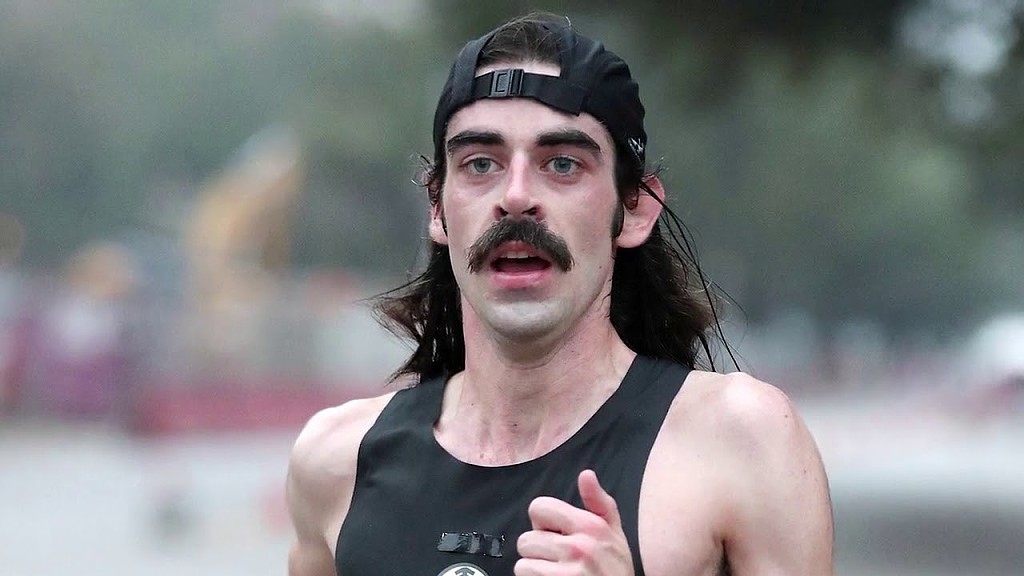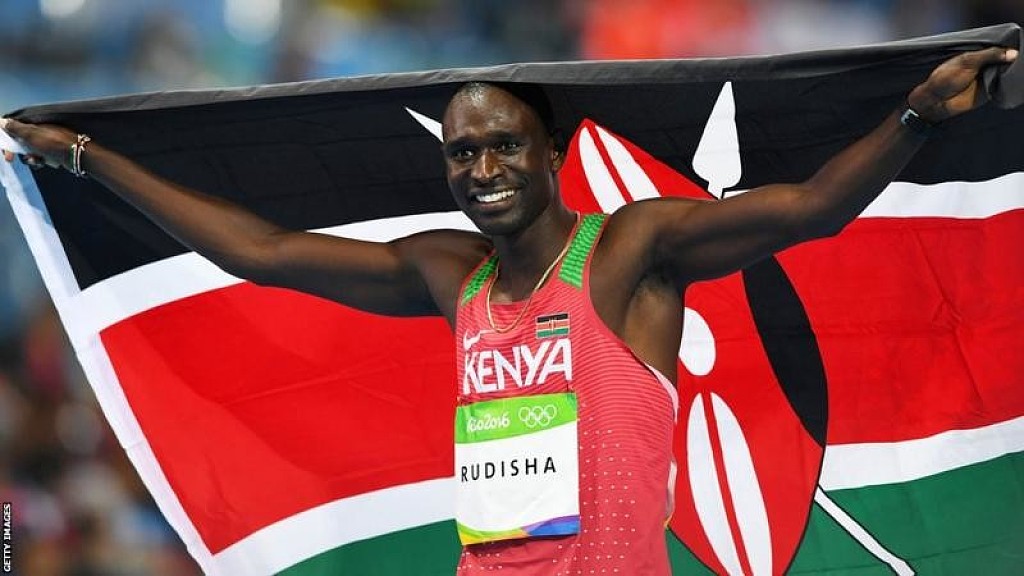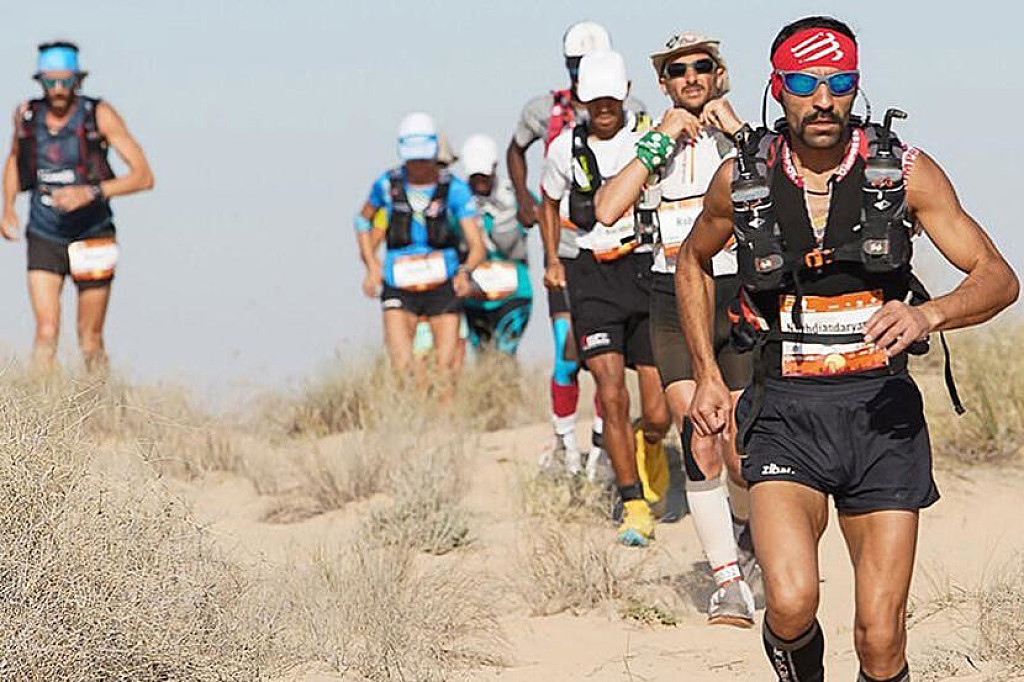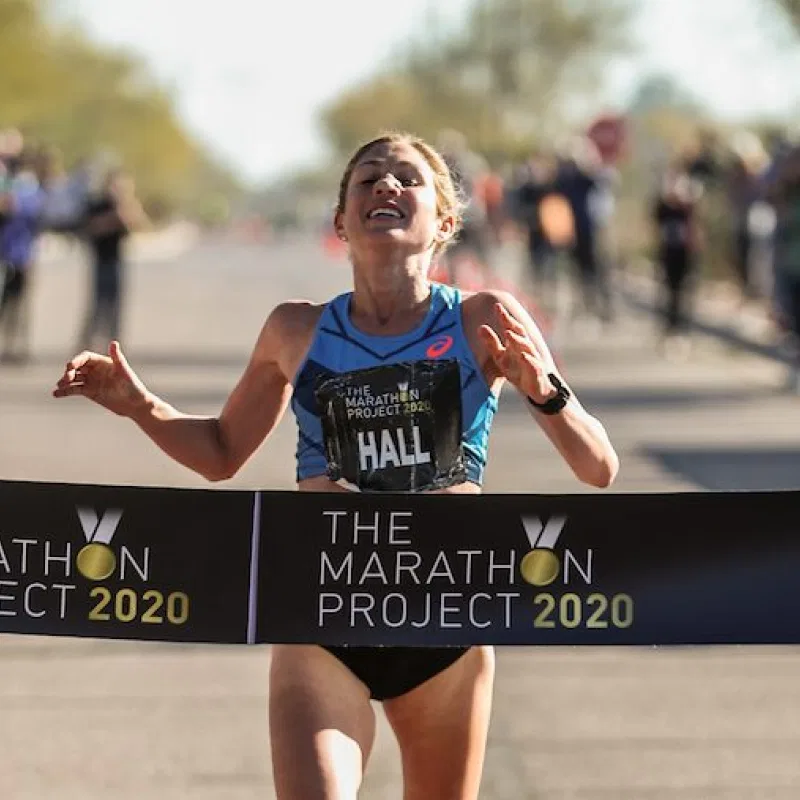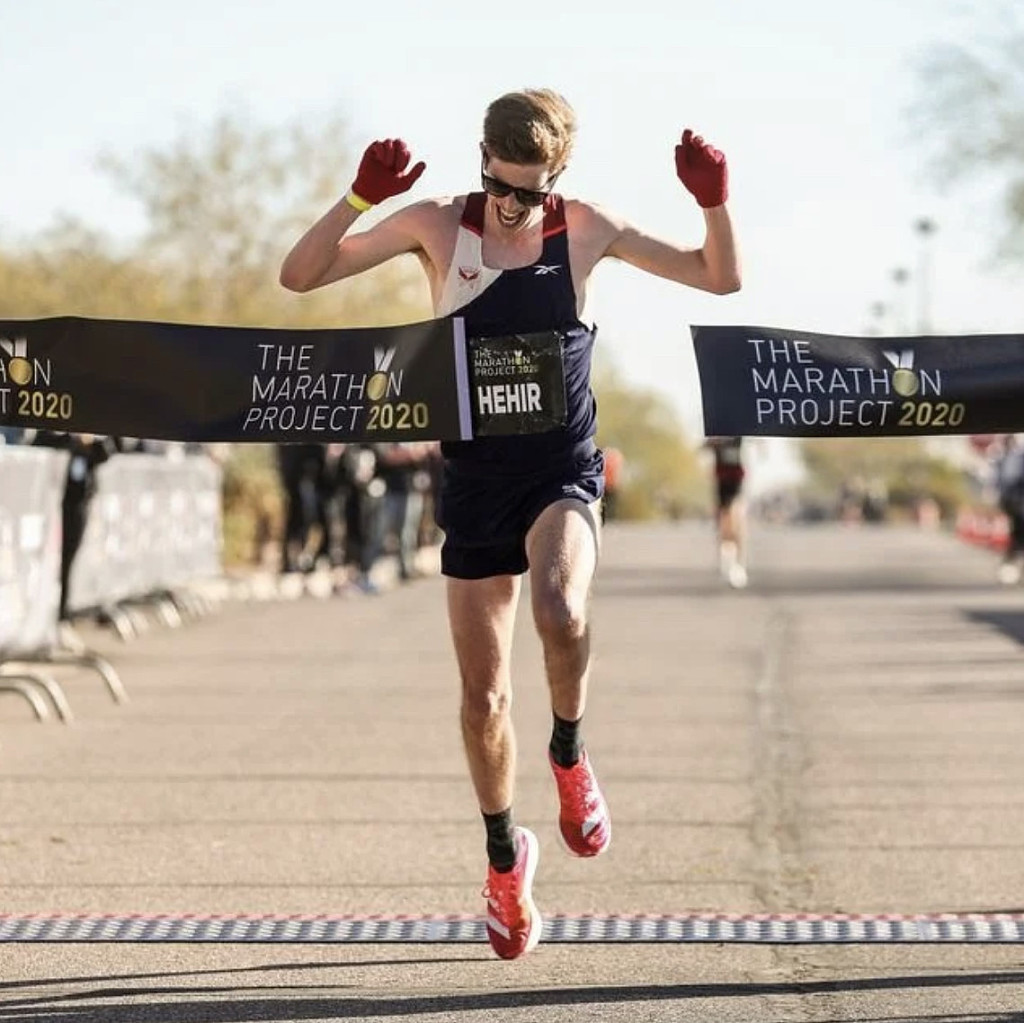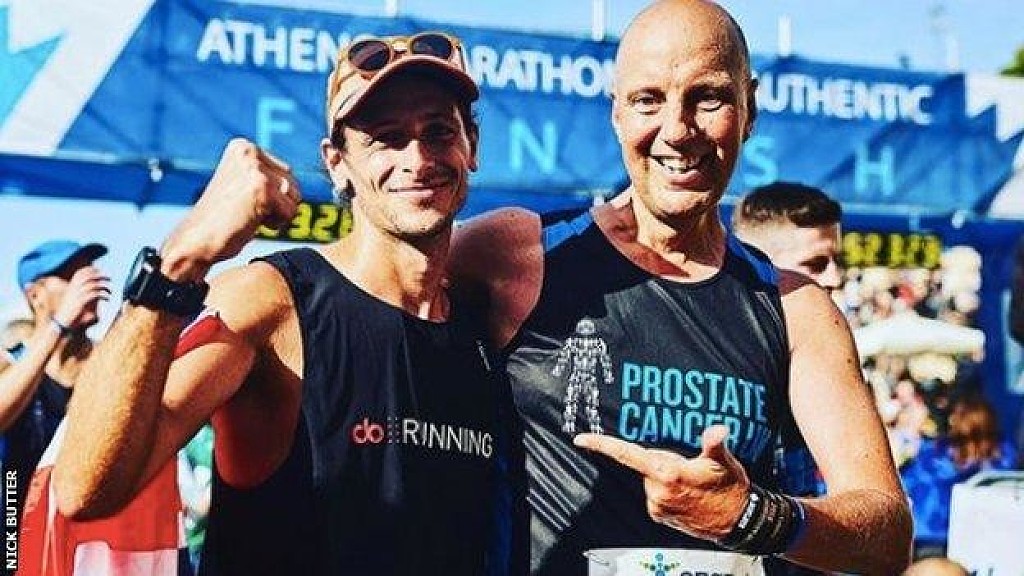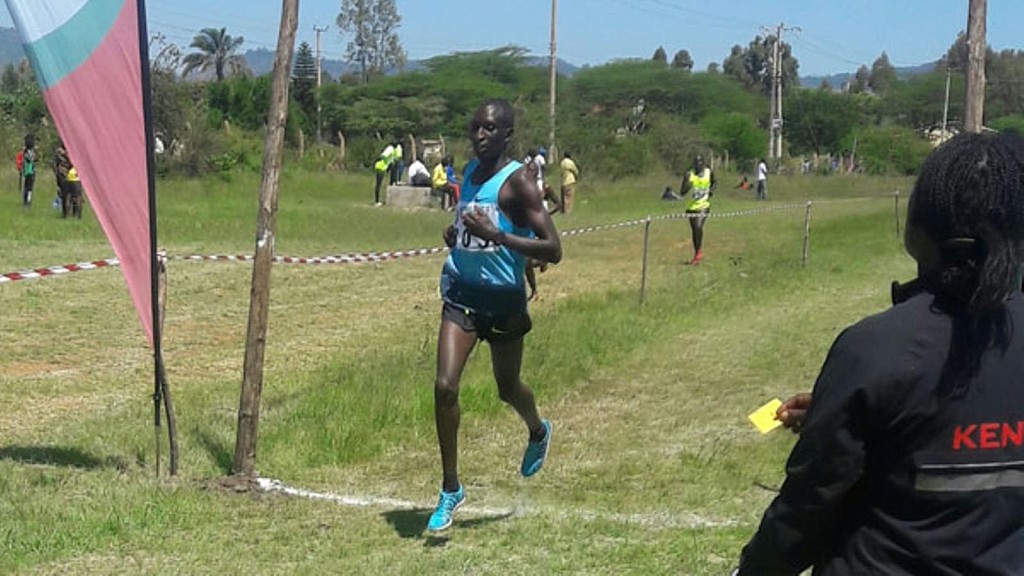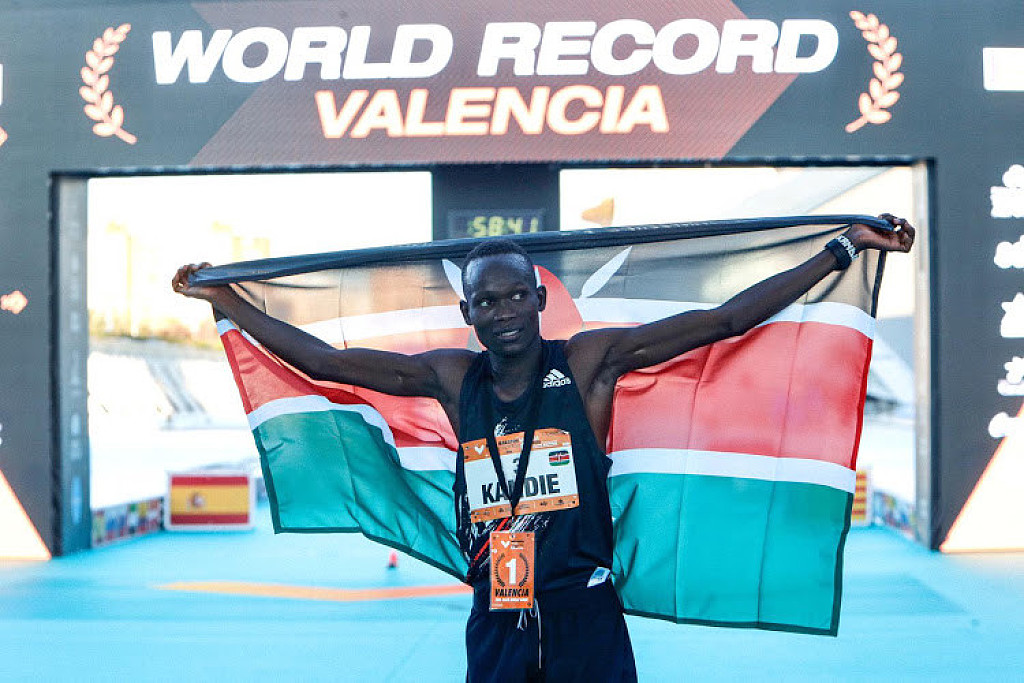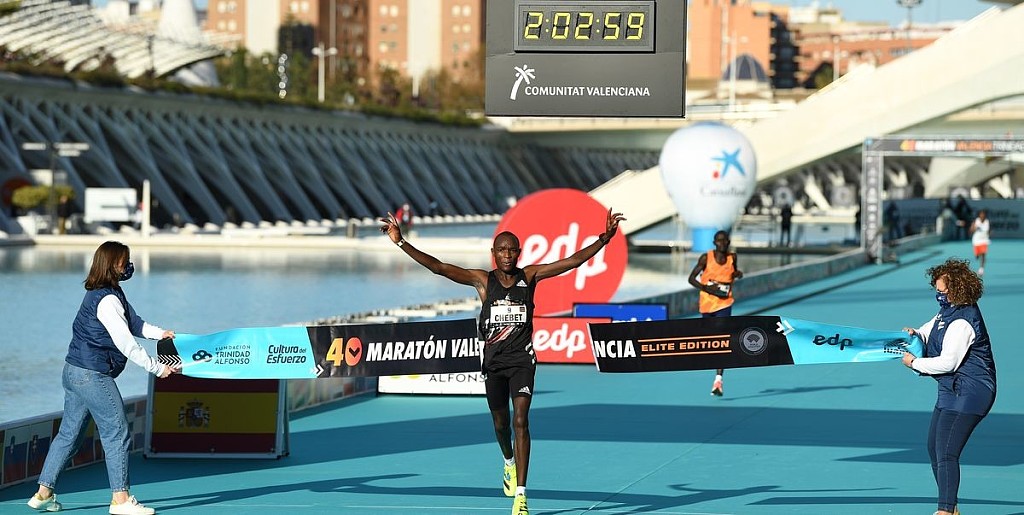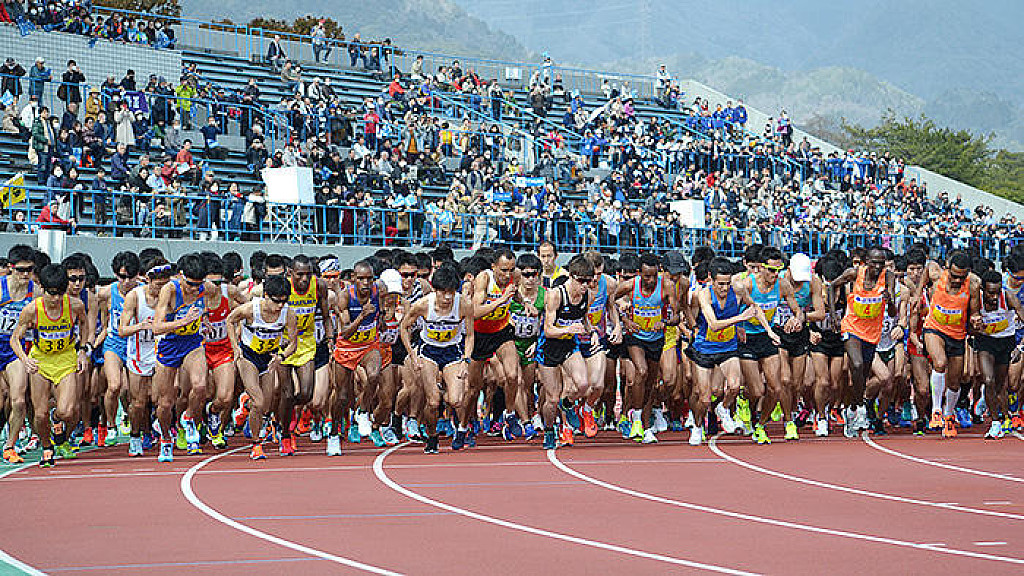Running News Daily
Top Ten Stories of the Week
12/26/2020
These are the top ten stories based on views over the last week.
From nowhere to the fastest Indiana marathon runner ever
Never ran in a state track or cross-country meet. Never ran in NCAA Division I nationals.
Now, at age 30, Noah Droddy has become the fastest marathon runner ever out of Indiana.

The Indianapolis native finished second Sunday in The Marathon Project at Chandler, Ariz., running six laps of a 4.3-mile loop. He covered the 26.2 miles in 2 hours, 9 minutes, 9 seconds.

Martin Hehir, an anesthesiology student, finished first in 2:08:59. Hehir was sixth Feb. 29 in the U.S trials at Atlanta, with three qualifying for the 2021 Tokyo Olympics.
On certified courses without aiding wind, Hehir and Droddy rank Nos. 7 and 9 in U.S. history.
Droddy averaged 4:56 per mile off even pace, clocking 1:04:28 for the first half and 1:04:41 for the second. By 10-kilometer splits, he ran the first 40 kilometers in 30:44, 30:26, 30:34 and 30:34.
Previous record by a native Hoosier was 2:11:13 by Hammond’s Rudy Chapa, who was seventh at New York in 1983.
Droddy’s previous best was 2:11:42 in finishing 17th at Chicago in October 2019. He had to withdraw from the Olympic Trials because of injury.
“There were those moments where I came back, and I said, ‘Ok what is a kind of unique talent that I have?” he said in a pre-race podcast. “Like, what am I passionate about pursuing? And that thing, to me, has always been running. It’s the one thing I’m willing to work extremely hard at, give everything to, and that I’m very fulfilled by.”
(12/21/20) Views: 89David Woods
Kenya's David Rudisha says he is yet to decide whether he will try and win a third straight 800 meters Olympic title in Tokyo next year
Rudisha, who turned 32 on Thursday, has struggled with injuries since defending his title in Rio in 2016 and has missed the last two World Championships.
Ankle surgery meant that the world record holder would not have been able to compete if the Tokyo games had gone ahead this year, instead of being delayed until 2021 by the global Covid-19 pandemic.
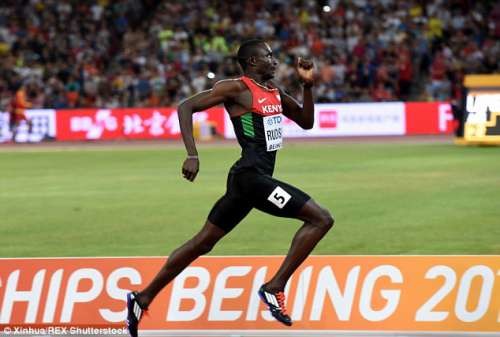
"Because of this difficult time with Covid and I have been up and down with injuries, I have been off, I have not been training," he admitted to BBC Sport Africa.
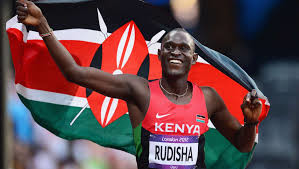
"I am hoping maybe next year I will make my decision whether I will come back and see the level of my physical fitness.
"That's when I will be able to assess my level and my standard and that will gauge if I will come back or I will make another decision but I love sports.
"Once an athlete, I will always be an athlete - so I will always be running at some level even if it is professional, or not professional or for fun but I love the sport and I enjoy running," he insisted.
David Rudisha: Olympic 800m champion on personal struggles, and Tokyo comeback
He insisted he will not be rushing to make a comeback from his latest injury.
"I had a bad injury in the beginning of the year and it is taking quite sometime and coming back you need to prepare yourself very well," he explained.
"I know that time is everything, if you do not have enough time I don't think it will be possible because running is not easy.
"It is a process and if I cannot have the period good enough for training I don't think I will be able to be there and to be at that level of professionalism, so I am just trying my best.
"Even if I come the year after next year all well and good and I will be happy because running is all about fun and would love to come back and it will depend on so many aspects."
(12/22/20) Views: 76Sport Africa
Al Marmoom Ultramarathon returns to Dubai in 2021
Looking for the ultimate fitness test for 2021? This one will test you – and is for experienced runners only.
Al Marmoom Ultramarathon is taking place on Friday March 5, 2021, in Dubai’s Al Marmoom Desert Conservation Reserve and it’s run over a whopping 50km.
The race will require endurance, courage and determination and will test runners to the limit.You’ll need to be fully trained and ready for it if you want to take part, but if you’re more of a casual runner, or are taking it up as a New Year’s resolution, then there are shorter 10km and 5km races too.
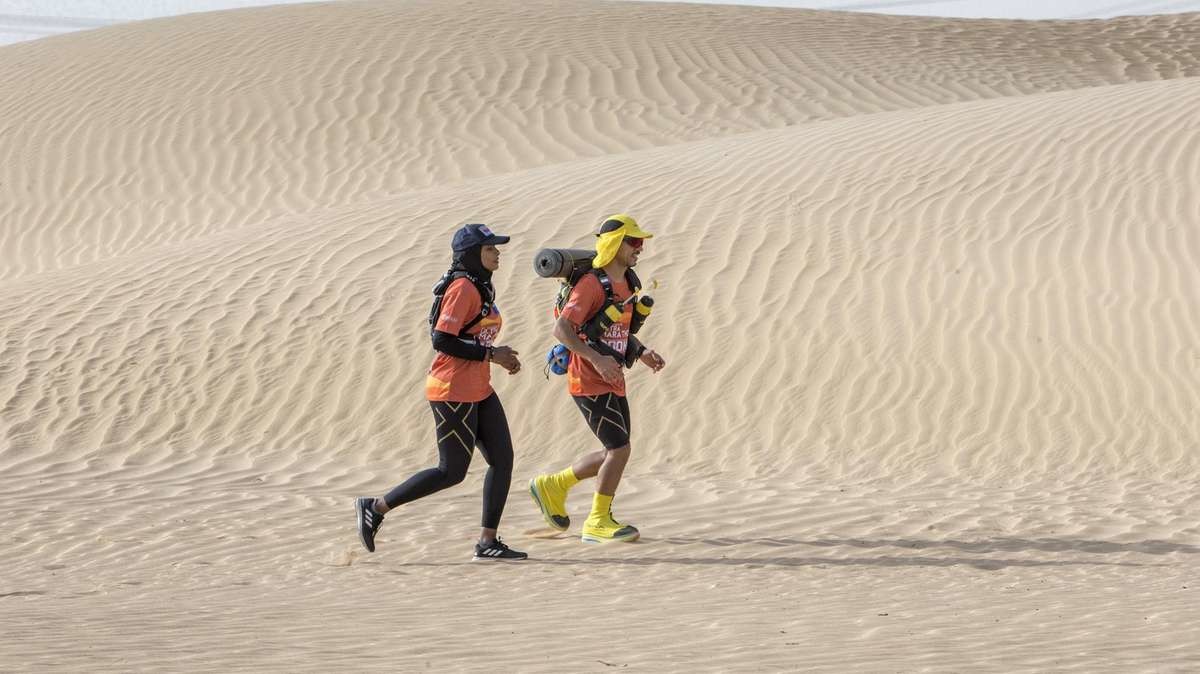
All three races will take runners into the desert and across both hard and soft sand, plus across the rolling dunes – so get ready for some spectacular scenery while you run. The desert reserve is also home to more than 200 species of native birds and more than 150 species of migratory birds.
There’s also 10km of lakes and it’s a protected area.
The race was launched in 2020, and this will be the second edition of the Al Marmoom Ultramarathon. All runners will get finishers medals, while the top three rankings in each category – both for male and female – will pick up a trophy. Registration is open now and runs through until March 2.
Runners in the ultramarathon must be over 18, plus have a medical certificate to show they are fit enough to compete.
(12/23/20) Views: 74Sarah Hall ran the second fastest time for the marathon at the Marathon Project
Sara Hall won The Marathon Project in Chandler, Arizona, on Sunday, December 20, running 2:20:32—making her the second-fastest American marathoner of all time. She took almost 90 seconds off her previous PR of 2:22:01, which she ran only 11 weeks ago at the London Marathon.
For about the first 18 miles of the race Hall, 37, flirted with the pace of Deena Kastor’s American record— 2:19:36—which has stood since 2006. But Hall, who ran behind two male pacesetters, couldn’t quite maintain the pace through the later miles.
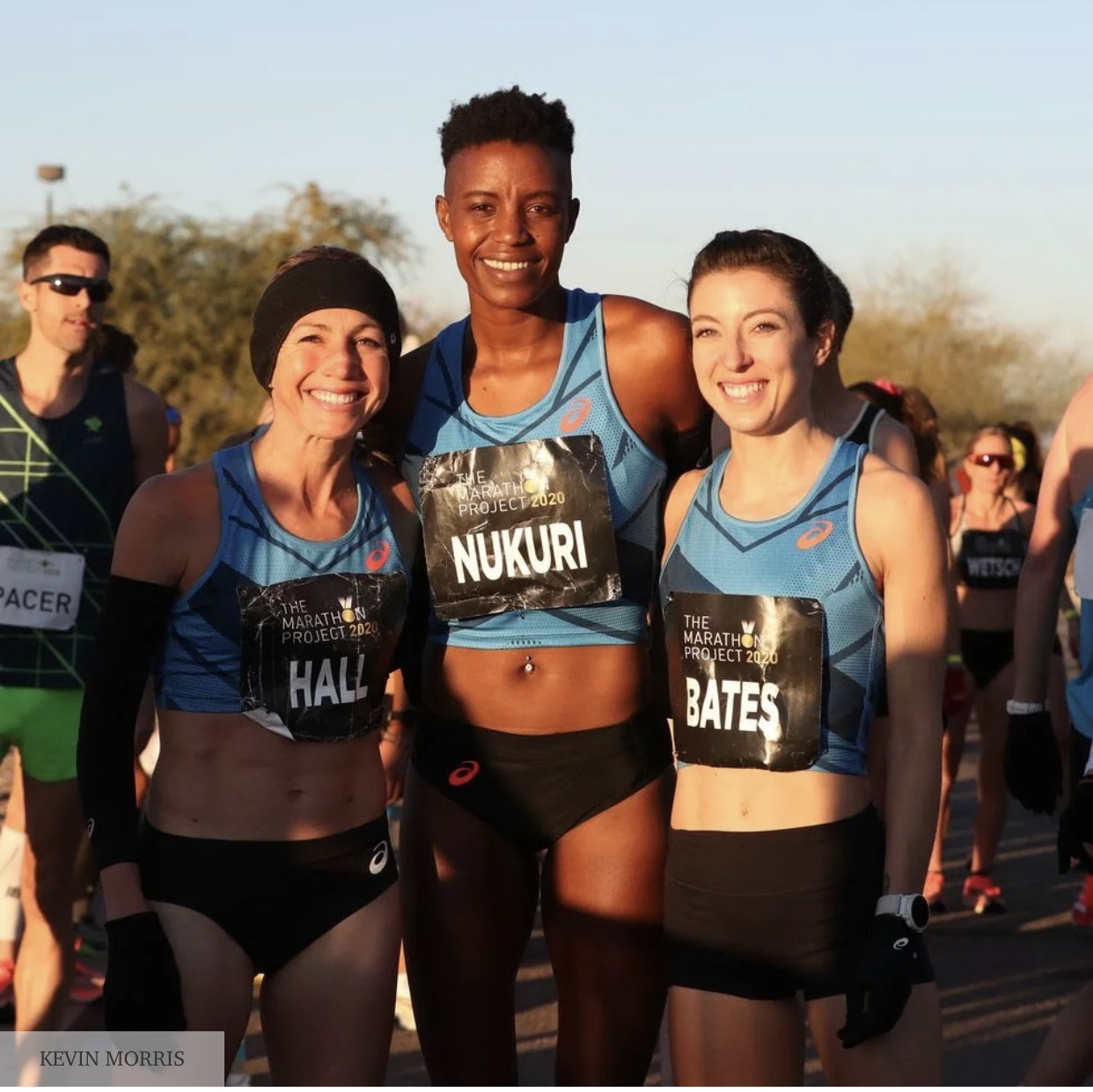
Keira D’Amato, the Virginia realtor who earlier this year ran an American record for the women’s-only 10 mile, finished second in 2:22:56, taking nearly 12 minutes off her previous marathon best.
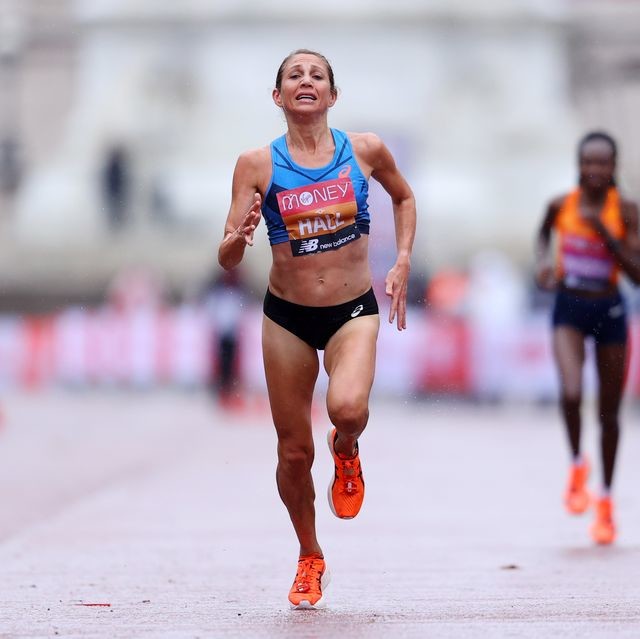
Kellyn Taylor, 34, who went with Hall for the first half of the race, fell back in the second half and finished in 2:25:22.
The 37-year-old Hall ran a personal best 2:22.01 at London on Oct. 4 and was hoping on a short turnaround to better Deena Kastor's 14-year American record of 2:19.36, set at London in 2006. She came close with another significant PR drop, improving from sixth best in U.S. history to second ahead of Jordan Hasay's 2:20.57 at Chicago in 2017.
"London was so wonderful getting to place as high as I possibly could have," Hall said. "This was more of a time trial, and that's kind of tough when it feels like training sometimes. I really look forward to when we can get back to normal races with crowds, but I feel so grateful for the guys I was able to run with. They kept me honest in the second half when I was really struggling."
She said being No. 2 on the American marathon list is "kind of surreal. I've had so much disappointment in my career (including not finishing at the U.S. Olympic Trials in February) and I would have walked from this sport 10 years ago. But my husband just relentlessly believed in me and God encouraged me there was more there. I kind of (rediscovered) my love for it. Getting rid of the fear of failure really helped me enjoy it a lot more."
Two-time Olympian Ryan Hall, third fastest all-time among American men's marathoners, now coaches his wife, whose next goal is to make the U.S. Olympic track team for Tokyo in the 10,000-meter.
Sara Hall 2:20:32
Keira D'Amato 2:22:56
Kellyn Taylor 2:25:22
Emma Bates 2:25:40
Natasha Wodak 2:26:19
(12/20/20) Views: 66Marty Hehir wins The Marathon Project Running a sub 2:09
Marty Hehir is the MARATHON PROJECT winner 2:08:59. Noah Droddy in second. Both lifetime PBs!
Hehir, 28, is in his fourth year of medical school in Philadelphia and applying to residency programs in anesthesiology.
He pushed the pace between miles 22 and 23, opening up a lead of several meters over Noah Droddy. Hehir grimaced through the final stretch, but dipped under the 2:09 mark, for a two-and-a-half-minute personal best. His time puts him seventh on the list of U.S. all-time marathoners.
Droddy finished second in 2:09:09, also an enormous personal record. Colin Bennie—who, like Hehir, is part of the Reebok Boston Track Club in Charlottesville, Virginia—was third in 2:09:38.
Mens Results
Martin Hehir 2:08:59
Noah Droddy 2:09:09
Colin Bennie 2:09:38
Scott Fauble 2:09:42
Ian Butler 2:09:45
(12/20/20) Views: 62The man who ran a marathon in every country in the world
"All of a sudden, I had this horrendous pain in my shoulder and chest. You know what the tell-tale signs are, but when you feel it yourself, it's very certain what's going on."
Nick Butter suffered a minor heart attack two miles from the finish line of a marathon on the Polynesian island of Samoa. This was the 182nd marathon of a trip in which, over the course of 674 days, he ran one in every country in the world. He's the first person to achieve such a feat.
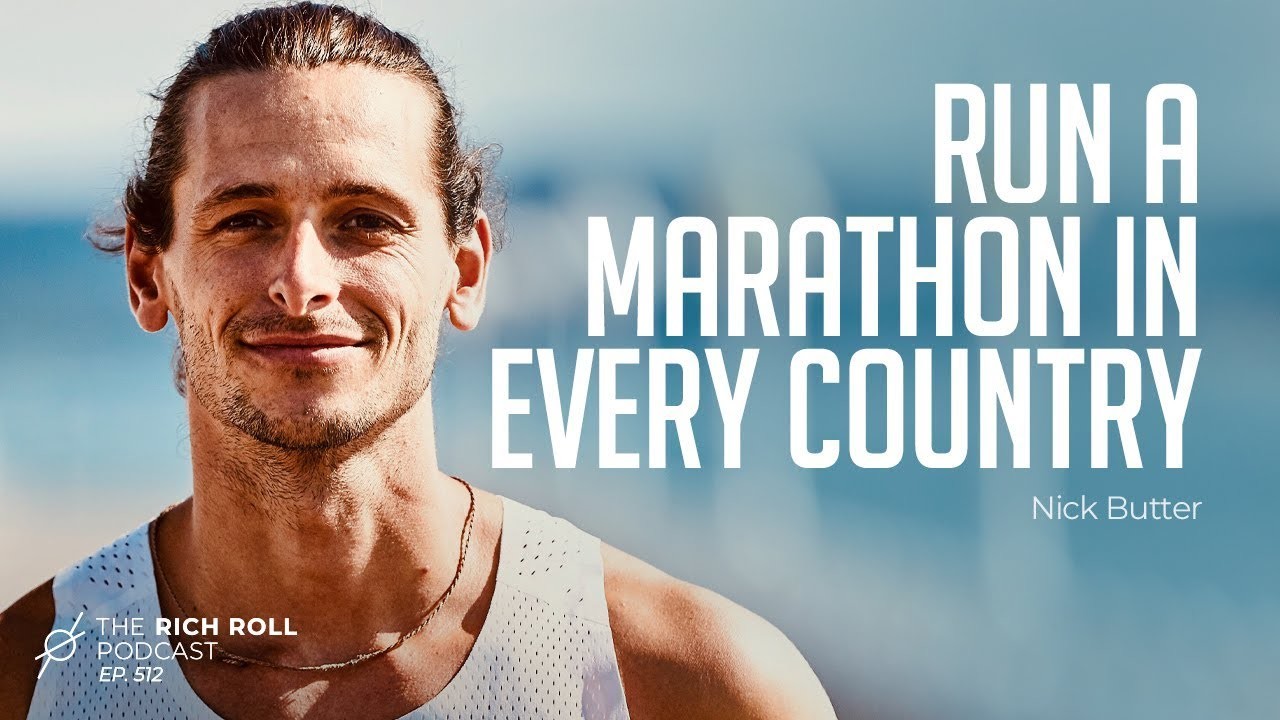
By this stage of the challenge, he'd already been shot at, mugged at gunpoint and attacked by dogs. It was one more obstacle to overcome. And the way it came about is quite typical of his habit of, well, taking a lot on.
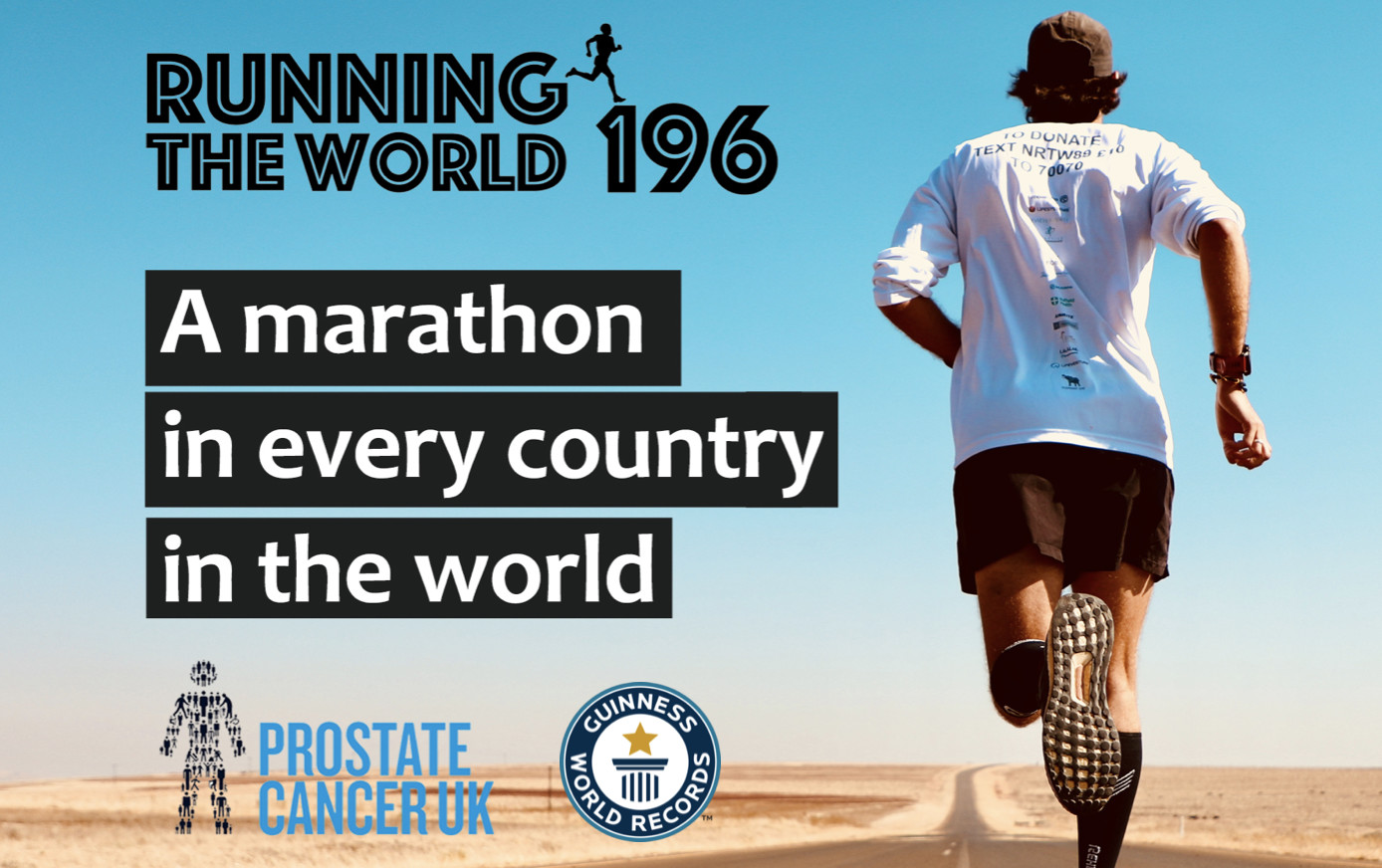
Butter often had a taxi driver, motorcyclist or cyclist with him, who would provide help with navigation, water and safety. On this occasion, a man from his hotel, Sani, had volunteered.
Unfortunately, it turned out that Sani hadn't ridden a bike for 20 years.
With eight miles left for Butter to run, Sani was in some pain and had to dismount. Rather than stop, or ask for help, Butter decided to run the rest of the marathon while pushing the bike and water himself.
"It was uphill, in 45C-plus heat, when I suddenly I had this pain," Butter says.
Without anyone around and no phone signal, he took a break by the side of the road and waited it out. Eventually, Sani caught up and took the bike back so that Butter, determined to finish, could hobble through the last section.
Afterwards he spoke to doctors and family friends who worked as medics. They all confirmed the symptoms of a heart attack. That didn't stop him flying to New Zealand to run another marathon just two days later. It's also worth mentioning he has a family history of heart problems.
"The medical answer is that I should have slowed down after that, but the actual answer is that I didn't," says Butter. He completed 211 consecutive marathons around the world - 193 in member countries of the United Nations, plus 18 more for "future-proofing".
It was in 2016 that a 26-year-old Butter had the idea. The goal was to raise money for Prostate Cancer UK.
"I wanted it to be big," Butter says. "It had to involve running and travel and it had to invoke something that Kev had said to me, which was 'don't wait for a diagnosis'."
A simple internet search for 'has anyone ever run a marathon in every country?' brought a negative answer.
"I couldn't believe it," he says. "We've put people on the moon! Of course, now I know why it's not been done before - it's very, very difficult."
After telling his family and friends, Butter started planning.
"I registered with Guinness World Records, spoke with some adventurer and runner friends and then I started to understand that I needed to contact media outlets, embassies, running clubs around the world. Hotels, people to do my safety, people to do my visas, working out a route, understanding the weather conditions, what my body would need to go through."
He says that beyond raising money, the goal was to spread awareness.
"I did something like 140 live TV appearances in different countries," Butter says. There were personal testimonies too.
"We had people come to us who previously hadn't any idea of prostate cancer, but, after speaking to us, got tested and discovered that they had it. Because they caught it early, they were fine."
Since finishing the trip, he has been doing speaking tours (lockdowns permitting), using his story to help educate. He's also published a book, Running The World.
Butter, writing in the closing chapter about his final leg of the 196-marathon trip, which began in Marathon, Greece, describes Webber turning up to run with him.
Five years on from Webber's terminal prostate cancer diagnosis, in which he was given an estimated two years to live, he and Butter crossed the finish line in Athens hand-in-hand.
The pair still talk regularly, and Butter says his friend is still running and still smiling.
(12/22/20) Views: 62Ciaran Varley
Charles Yosei and Sheila Chelangat are keen to run at both the World Cross Country Championships in Bathurst, Australia and Olympic Games in Tokyo next year
Charles Yosei, who is a former Africa cross country bronze medalist and Chelangat, a former Youth Commonwealth Games 3,000m champion said this after winning the second leg of Athletics Kenya Cross country meeting at the Koileel Samoe University
However, junior winners in Nandi, Agnes Jebet (women's 6km) and newcomer Felix Korir (men's 8km), said they have their eyes fixed on the World Under-20 Championships set for August next year at the Moi International Sports Center (MISC), Kasarani.

Yosei won the senior men's 10km title in 30:38.3 ahead of Phenus Kipleting (30:40.3) and Nicholas Kimeli (30:43.2), who completed the podium.
The race, which attracted over 300 athletes, saw Family Bank Half Marathon champion Daniel Simiu fail to impress despite winning the opening leg in Machakos a fortnight ago.

He placed fourth in 30:44.6 as Robert Kiprop (30:57.5) and Michael Bett (31:01.9) closed the top six positions in the race.
“I am in good shape and hopefully, I will make the team to the World Cross Country Championships in Bathurst, Australia on March 11 next year. I want to use cross country to prepare for the 2021 Olympic Games,” said Yose.
Kericho-based Chelang’at won the senior women’s 10km race in 34:25.6 while Joyce Jepleting (34:28.8) and Gladys Chepkirui (34:42.2) placed second and third respectively.
Former Africa junior 5,000m silver medallist Edina Jebitok (34:54.5), Mercy Jeptarus (34:55.7) and Eva Cherono (35:01.7) followed in that order for the top six places.
“The race was not easy. Beating 301 athletes was tough and I want to build on this as I focus on the Olympic Games,” he said.
(12/21/20) Views: 57Emmanuel Sabuni
World Half Marathon record holder Kandie Kibiwott and world defending champion Jacob Kiplimo of Uganda will face off at the Ras Al Khaimah Half Marathon in February next year
Kandie and Kiplimo to renew rivalry in Ras Al Khaimah Half Marathon.
The two are fast becoming rivals in the 21km race having faced off several times this year.

In their latest meet-up on December 6, the Kenyan emerged top after clocking a world record 57:32 to finish ahead of Kiplimo at the Valencia Marathon.
Kandie's win was revenge for his loss at the hands of the Ugandan at October's World Half marathon Championships in Gydnia, Poland where the latter crossed the finish line in in 58:49 — five seconds ahead of Kandie.
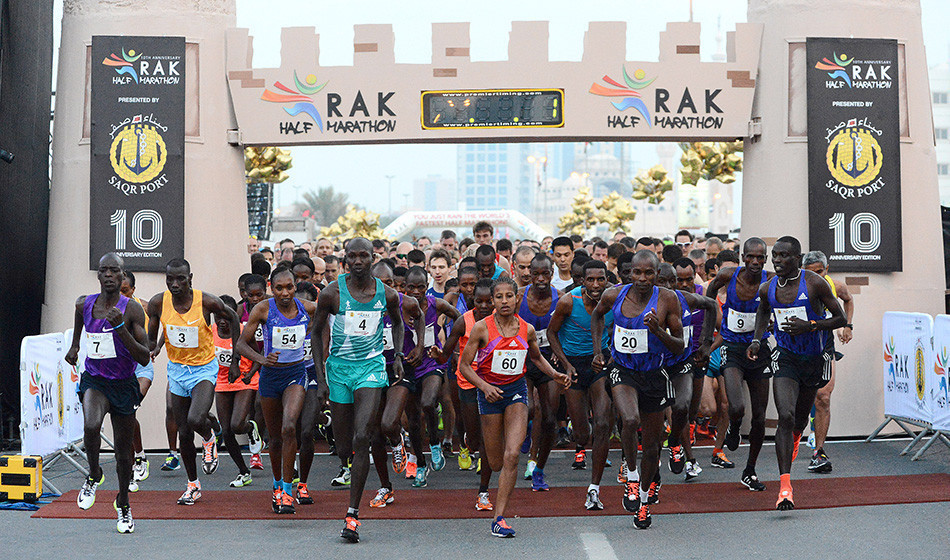
In 2019, Kandie 42:39 edged Kiplimo (43:00) in the San Silvestre Road Race in Brazil. Other entrants in men's category include Alexander Mutiso Munyao, Ethiopian Mosinet Geremew, Japan-based Bedan Karoki and Stephen Kiprop, winner of the 2019 edition.
Geremew won the Dubai Marathon in 2018 and came second in the London Marathon in 2019 with a time of 2.02.55, clocking the 4th fastest time ever in that distance.
Meanwhile, Mutiso recently placed 4th in Valencia in 57.59 and was runner-up in the men’s 2020 Ras Al Khaimah Half Marathon in 59:16.
In the women's category, World Half Marathon champion Peres Jepchirchir will battle against World marathon record holder Brigid Kosgei and 2019 World marathon champion Ruth Chepngetich.
Jepchirchir has fond memories of the Ras Al Khaimah Half Marathon, where she set her personal best time of 1:05.06 in 2017 on her way to victory. Chepngetich recently clocked a remarkable time of 1.05.06 at the New Delhi Half Marathon.
At the 20th Dubai Marathon in 2019, she won in a course record breaking time of 2.17.08, securing the world’s 4th best marathon time ever. Ethiopia's Ababel Yeshaneh will also be in contention.
(12/18/20) Views: 56William Njuguna
Fresh from winning Valencia Marathon with a course record, Evans Chebet is looking towards the Olympic Games
Chebet, who edged out experience marathoners like Boston and Chicago Marathon champion Lawrence Cherono for the title, said his focus has now shifted to the Olympic Games.
“Running at the Olympic Games will be good achievement for me. It has been a long journey and making the marathon team will be a dream come true for me,” he added.
The Elgeyo Marakwet-based runner returned home after winning Valencia 42km race in a personal best time of of 2:03:00 ahead of compatriot Cherono (2:03:04) and Ethiopian Birhanu Legese (2:04:53), who completed the podium.
“It will be good if the team is named early to ensure we start our preparations on time. If I can make the team, I assure Kenyans that I will return with a medal,” added Chebet, who competed alongside world marathon bronze medalist Amos Kipruto.

“I look forward to competing for my country at the Olympics Games after a good break and my prayer is that Athletics Kenya names the team early," said a jubilant Chebet. He said his biggest worry in Valencia was Legese but he is happy he shook him off.
Amos Kipruto, who has dominated in many marathons across the world, was named alongside Eliud Kipchoge and Lawrence Cherono in the Olympic Games marathon team.
“I managed to run my personal best because that was my target and I still believe I will be joining Team Kenya to the Tokyo show. The team that ran in Valencia was the best and we hope the federation will take note,” said Kipruto.
In 2019, Kandie 42:39 edged Kiplimo (43:00) in the San Silvestre Road Race in Brazil. Other entrants in men's category include Alexander Mutiso Munyao, Ethiopian Mosinet Geremew, Japan-based Bedan Karoki and Stephen Kiprop, winner of the 2019 edition.
Geremew won the Dubai Marathon in 2018 and came second in the London Marathon in 2019 with a time of 2.02.55, clocking the 4th fastest time ever in that distance.
Meanwhile, Mutiso recently placed 4th in Valencia in 57.59 and was runner-up in the men’s 2020 Ras Al Khaimah Half Marathon in 59:16.
In the women's category, World Half Marathon champion Peres Jepchirchir will battle against World marathon record holder Brigid Kosgei and 2019 World marathon champion Ruth Chepngetich.
Jepchirchir has fond memories of the Ras Al Khaimah Half Marathon, where she set her personal best time of 1:05.06 in 2017 on her way to victory. Chepngetich recently clocked a remarkable time of 1.05.06 at the New Delhi Half Marathon.
At the 20th Dubai Marathon in 2019, she won in a course record breaking time of 2.17.08, securing the world’s 4th best marathon time ever. Ethiopia's Ababel Yeshaneh will also be in contention.
(12/18/20) Views: 54Emmanuel Sabuni
Lake Biwa Mainichi Marathon, Japan's first World Athletics gold label race will be discontinued after 2021 Race
In an interview with a source involved in the decision, it was learned on Dec. 17 that the Lake Biwa Mainichi Marathon will be discontinued after next year's 76th edition on Feb. 28, 2021. One of Japan's three major men's marathons, Lake Biwa's position on the calendar as the last chance to qualify for Olympic and World Championships teams meant it has had a long history of being the place where Japan's best marathoners earned to right to compete against the best in the world. But in recent years Lake Biwa has felt increasing pressure from the rise of the Tokyo Marathon, where national records and other fast times have been run almost every year, and Lake Biwa's relevance and value began to come into question. The Osaka Marathon is likely to replace Lake Biwa as a national team selection race in the future.
Having begun in 1946, Lake Biwa is the oldest existing marathon in Japan. Along with the Fukuoka International Marathon and the Tokyo Marathon it is counted as one of Japan's three major men's marathons. But now its long, colorful history is set to come to an end next year when Olympic marathon trials winner Shogo Nakamura (28, Fujitsu) and others stand on its starting line one final time.
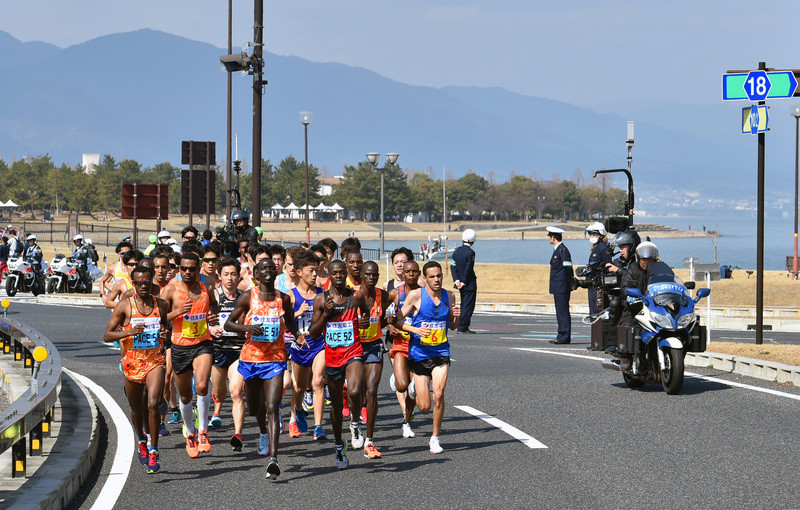
Starting and finishing on the track at Ojiyama Field, Lake Biwa has long been the final selection race for Olympic and World Championships teams. At both the 2012 London Olympics and 2016 Rio de Janeiru Olympics two of the three men's team members earned their places at Lake Biwa. At both the 1964 and 1968 Olympics all three members were chosen there. Its position on the calendar relative to Fukuoka and Tokyo meant the battles were always furious, and those who emerged victorious went on to take on the world.
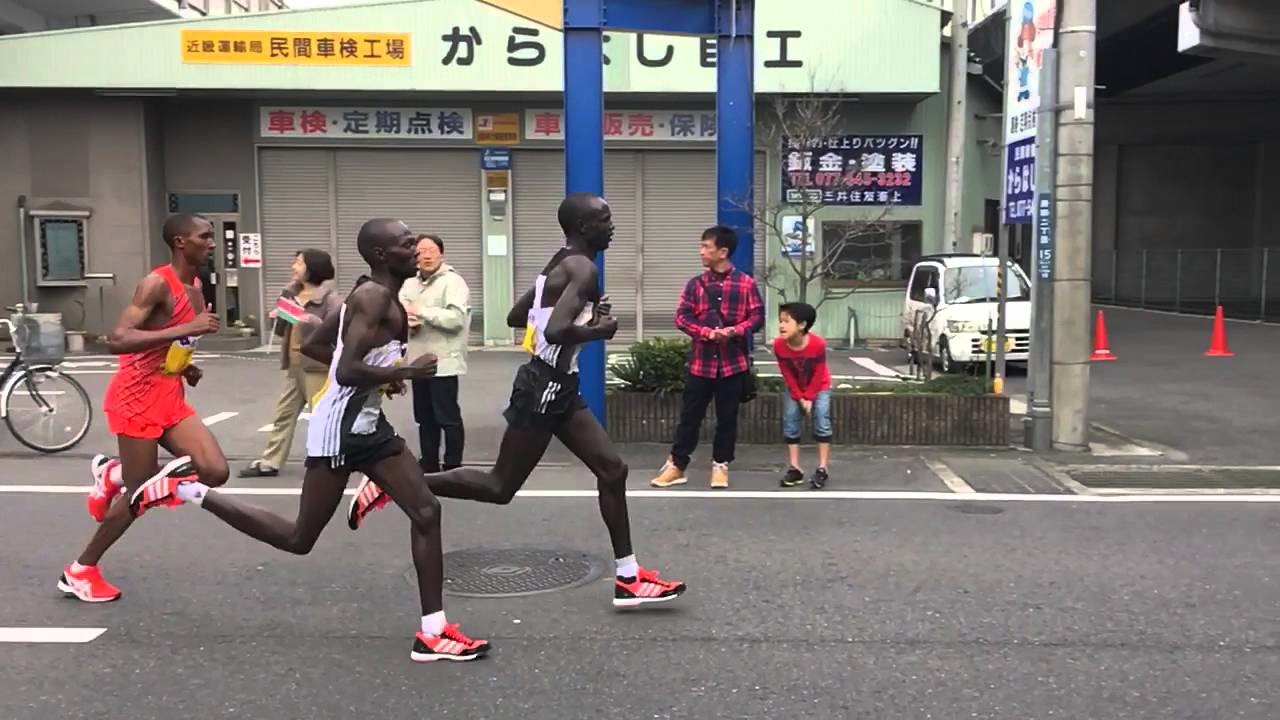
There's no question that Lake Biwa has been the site of countless classic races and a vital part of Japan's marathon tradition, but in recent years its relevance has faded. One of the major factors in this was the Tokyo Marathon's change to a faster course in 2017. In 2018 Yuta Shitara (29, Honda) broke the Japanese national record in Tokyo, and two years later Suguru Osako (29, Nike) followed Shitara's lead and did the same. With that record of success, Tokyo has become the first choice for Japanese men targeting fast times.
The outcome of that change for Lake Biwa, an elite-only marathon, was that the athletes who could have provided the fireworks started staying away. With the Tokyo Marathon having moved to Lake Biwa's traditional date the first Sunday in March two years ago, Lake Biwa's shift a week later meant it was now the same day as the Nagoya Women's Marathon, hiding it in the shadows even further. The race's viability, financial and otherwise, came into question.
According to those involved, the Osaka Marathon is the most likely candidate to replace Lake Biwa as a national team selection event. With 35,000 people running on a downtown urban course it is the second-largest marathon in Japan after only Tokyo. With that kind of modern prestige to it, Osaka is highly likely to pick up the selection race label.
Modernity has a way of burying history. The MGC Race, a one-shot selection race for the Tokyo Olympics, was a major success. Those in power are leaning toward using the same kind of single trials race for the 2024 Paris Olympics. With the coronavirus crisis an ongoing issue, this is a period of transition. The Japanese marathon world isn't immune to those transitional forces, and we can only hope that its reorganization and reformation produce even more exciting races.
(12/18/20) Views: 52Brett Larner


